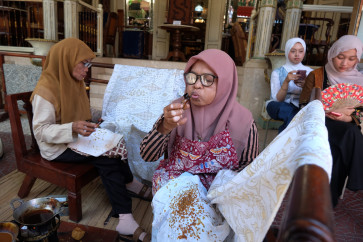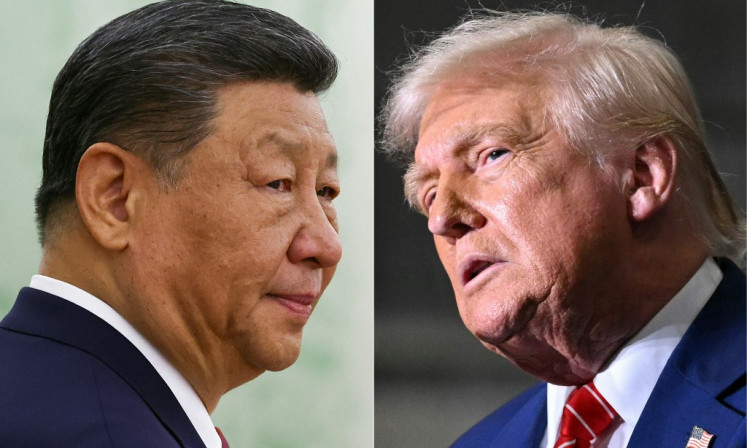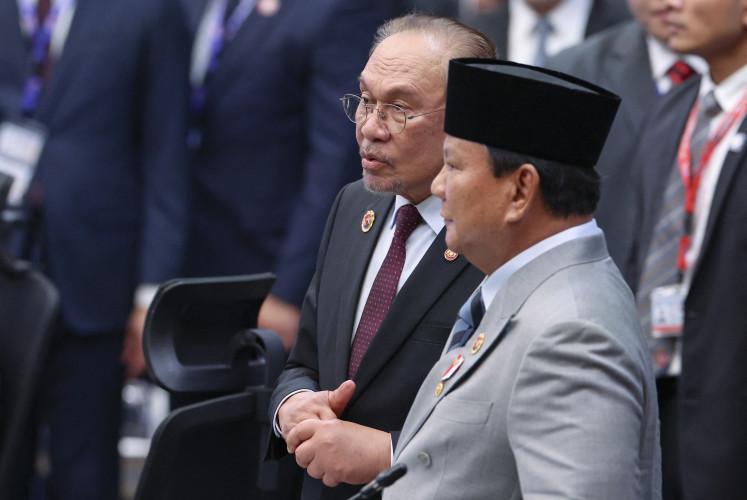Popular Reads
Top Results
Can't find what you're looking for?
View all search resultsPopular Reads
Top Results
Can't find what you're looking for?
View all search resultsPeople with AIDS face social stigma, poor healthcare
Indonesia is seen as unfriendly by those living with HIV/AIDS, with many claiming to have faced various forms of discrimination in their neighborhoods or workplaces
Change text size
Gift Premium Articles
to Anyone
I
ndonesia is seen as unfriendly by those living with HIV/AIDS, with many claiming to have faced various forms of discrimination in their neighborhoods or workplaces.
With recent reports of people with AIDS being prescribed expired antiretroviral drugs in Jakarta, Jambi, Maluku and Yogyakarta — as revealed in an Indonesian Network for HIV Infected People (JOTHI) report this year — it seems that the poor living conditions that people with HIV/AIDS currently face are not about to change anytime soon.
“We’re just too tired of seeing our friends die one by one due to poor access to medical treatment,” Heru Widarsah, an activist with the JOTHI, told The Jakarta Post.
It is believed that HIV cases have continuously increased as social stigma and discrimination have given people with HIV/AIDS further cause to despair, and have prevented them from seeking proper medical treatment.
Dedi Sumantri, a 33-year-old man with HIV, has tried to live as normal a life as is possible.
“To date, however, many people do not even want to shake my hand. It hurts me very much.”
People would not fear social or even physical contact with people living with the HIV/AIDS if they were sufficiently informed about the disease, he added.
Yet, many people stigmatize people with HIV because they do not fully understand it, despite several recent widespread HIV/AIDS awareness campaigns. As a result, people with HIV/AIDS would rather sit “idle” than seek the necessary medical treatment.
People from high risk groups tend to be reluctant to be tested for the disease because they fear the harsh stigma and discrimination that may come their way should they be diagnosed positive.
The number of new HIV/AIDS cases diagnosed in Indonesia continues to climb. According to the Health Ministry, new HIV cases reached 21,591 in 2010, up from 14,427 cases in the previous year. Meanwhile, new AIDS cases reached 4,917 in 2010, up from 3,863 in 2009.
Stigmatization and lack of access to antiretroviral drugs have sparked concern over whether the government has enough invested in resources to educate the public about the disease and to provide adequate medical treatment to combat chronic symptoms of HIV/AIDS.
According to the Health Ministry, budgetary allocations for HIV/AIDS control and medical treatment programs continue to increase from year to year. The HIV/AIDS control fund is projected to reach Rp 136.4 billion (US$14.86 million) in 2011, a slight decrease from Rp 139.3 billion in 2010.
The fund is used to cover logistical needs to stem the spread of HIV/AIDS and other sexually transmitted diseases; epidemiology surveillance, as well as monitoring and evaluation.
Meanwhile, the ARV drugs procurement budget is projected to reach Rp 85.9 billion, up from Rp 84.2 billion in 2010.
Tony Wendra, the director of HIV/AIDS control at the Health Ministry, said that the allocated resources for combating the disease were more than enough. “Even if we have delayed distribution, these usually stem from bureaucratic problems which sometimes cause slow delivery. We are ready to fix that problem,” he said, adding that geographical challenges were also major challenges in distributing the ARV drugs.
To cope with the disease, the government has introduced a comprehensive anti HIV/AIDS program which includes voluntary counseling and testing (VCT), preventing mother to child transmission (PMTCT) of HIV, sexually transmitted disease management, behavior change intervention, methadone opiate replacement therapy, HIV/AIDS care, support and treatment (CST), tuberculosis-HIV screening, and monitoring and evaluation.
Having been addicted to injecting drug since 1996, Dedi says his life has been more productive since he started taking methadone as an opiate replacement therapy in October last year. “I can get through my life normally,” Dedi said.
Methadone, which is consumed orally, can produce a sensation of euphoria similar to that of the low-grade heroin favored by injecting drug users in Indonesia. The advantage is that addicts given methadone therapy have longer withdrawal periods.
Citing an example, Dedi said that by consuming 70 grams of methadone, he could get through his daily activities normally for 36 hours without suffering withdrawal symptoms. It is also not too costly. He has to spend only Rp 5,000 a day on his methadone therapy, which is far cheaper than low-grade heroine. Most heroine addicts turn to crime to pay for their drug addiction. Dedi used to spend Rp 100,000 a day on low-grade heroine.
Methadone therapy also prevents needle-sharing. “That’s why injection-transmitted HIV incidents continue to decline after this intervention was first introduced last year,” Dedi said.
However, many people have poor access to the service, especially people living in remote areas.










